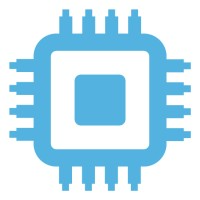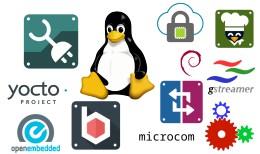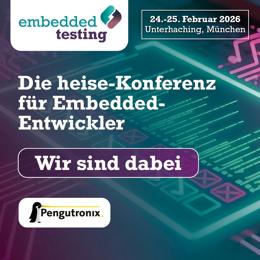Pengutronix at FOSDEM 2021
"FOSDEM is a free event for software developers to meet, share ideas and collaborate. Every year, thousands of developers of free and open source software from all over the world gather at the event in Brussels. In 2021, they will gather online." -- FOSDEM
This year, we will gather at 6th and 7th February and members of Pengutronix will contribute to FOSDEM with three talks.
So, grab your beer (what would a FOSDEM be, without beer?) and join us!
| Time | Testing and Automation devroom |
|---|---|
| Sa, 12:25 | About the joy and tears of testing Embedded Devices (Chris Fiege) |
| Time | Embedded, Mobile and Automotive devroom |
|---|---|
| Sa, 13:00 | From Reset Vector to Kernel: Navigating the ARM Matryoshka (Ahmad Fatoum) |
| Sa, 16:00 | The Road to the Mainline ZynqMP VCU Driver (Michael Tretter) |
About the joy and tears of testing Embedded Devices (Chris Fiege)
Embedded development is complex enough. By automating repetitive parts during development and employing testing, a lot of time can be saved and human errors avoided. Additionally, embedded development is usually a team effort: scarce hardware must often be shared between developers and sometimes even with automated testing. labgrid is an open source tool for remote control and testing of Embedded Linux Devices in a distributed lab. In this talk the presenter takes a look at how labgrid can be used in your Embedded lab and what labgrid's developers have learned in over three years of using and developing it.
At first the presenter takes a closer look at what is actually needed to fully remote-control an Embedded Linux Device: What are the typical interfaces that need to be covered? What remote-control hardware is commercially available?
Next the presenter will focus on the labgrid framework. Labgrid is an embedded board control python library, with a focus on testing, development and general automation. After a short overview of the key design-concepts the presenter will discuss labgrid's architecture. This part finishes with a demo of how interactive development with labgrid looks like and how tests are implemented using pytest.
The talk will conclude with a lessons-learned with the joy and tears of over three years of active labgrid development and use.
The Road to the Mainline ZynqMP VCU Driver (Michael Tretter)
The Xilinx ZynqMP SoC includes a powerful H.264/H.265 Video Codec Unit (VCU) which Xilinx supports with an out-of-tree driver and user space library. The allegro driver from mainline Linux allows to use the VCU using the standard V4L2 encoder API without requiring any custom user space.
I will explain why I wrote the driver, show how the VCU is used from a driver perspective, and present the current state of the driver and which features are still missing.
The Zynq UltraScale+ MPSoC integrates several ARM cores and an FPGA into a single chip. One variant of this SoC includes an H.264/H.265 Allegro DVT Video Codec Unit (VCU).
Although Xilinx did a good job supporting the ZynqMP in mainline Linux, the VCU was originally only supported via an out-of-tree driver. It consists of a user space library and a firmware blob, which interact via a custom IOCTL interface. Unfortunately, this has security implications as the user space handles physical buffer addresses.
Fortunately, the V4L2 mem2mem device API for video codecs avoids this problem by using abstract DMA buffers. Many applications already use these APIs, and various drivers for hardware codecs already implement these APIs. Thus, a V4L2 driver for the VCU allows reusing existing applications such as FFmpeg and GStreamer on the ZynqMP.
Weiterführende Links
Pengutronix auf dem Live Embedded Event
Jetzt, wo sich durch die COVID-19-Pandemie alle an die Digitalisierung und Online-Konferenzen gewöhnt haben, war es noch nie so einfach, eine Konferenz zu organisieren und alle Experten und Interessierten aus einem Bereich für wenige Stunden des intensiven Ideenaustauschs zusammenzuholen.
Pengutronix auf der Embedded Linux Conference Europe
Das Programm der diesjährigen Embedded Linux Conference Europe (ELCE) wurde in den letzten Tagen veröffentlicht. Wie auch in den letzten Jahren beteiligt sich Pengutronix auch dieses Mal mit Vorträgen zu aktuellen Themen.
FOSDEM 2020 – Recommended Talks
FOSDEM is one of the biggest Open Source community meetings in Europe and takes place in Brussels at the Université Libre de Bruxelles every year in February. For Pengutronix this is always a good chance to meet developers, discuss current topics and enjoy some Belgian beer and food. This year we attended FOSDEM with 15 colleagues. Here are some talks our colleagues recommend you to see.
Pengutronix aktuelle Open-Source-Contributions
Wir nehmen das Linux-6.19-Release zum Anlass, uns anzuschauen, was Pengutronix in den letzten drei Monaten zu verschiedenen Open-Source-Projekten beigesteuert hat.Pengutronix bei der Embedded Testing 2026
Pengutronix ist in diesem Jahr wieder Partner der der Embedded Testingu nd ist dort sowohl mit einem Stand als auch mit einem Vortrag vertreten. Die Embedded Testing findet am 24. und 25. Februar 2026 in Unterhaching bei München statt.Pengutronix at FOSDEM and OE Workshop 2026
On January 31st and Febuary 1st 2026 it is once again time for waffles, Belgian beer and Open Source: FOSDEM will take place at ULB in Brussels. With over 8k hackers, FOSDEM is the biggest and most important Open Source conference in Europe. One other event riding the wave of FOSDEM is the the OpenEmbeddedWorkshop. The full list of co-located events is here. We are participating in both FOSDEM and OE Workshop and are looking forward to many interesting discussions with developers of different Open Source software components – be it the Linux kernel, Yocto, Labgrid, Debian, and others...
RAUC und labgrid Sponsoring-Pakete ab jetzt im Shop!
RAUC und labgrid sind Open Source Software-Projekte, die beide bei Pengutronix gestartet wurden und in ihren jeweiligen Nischen mittlerweile recht erfolgreich geworden sind. Ab heute ist es möglich Sponsoring-Pakete im Linux Automation GmbH Shop zu erwerben, die die Entwicklung dieser Projekte unterstützen.GStreamer Conference 2025
This years GStreamer conference was held at the end of Oktober in London, UK. Since GStreamer is our goto-framework for multimedia applications, Michael Olbrich and me were attending this years conference to find out what's new in GStreamer and get in touch with the community.
umpf - Git on a New Level
Moderne Softwareentwicklung ohne begleitende Versionsverwaltung wie Git ist heutzutage unvorstellbar - Änderungen am Quellcode sollen schließlich nachvollziehbar dokumentiert und beliebige Verssionsstände jederzeit einfach reproduziert werden können. Für Arbeiten an komplexeren Projekten wie etwa dem BSP ("Board Support Package") eines eingebetteten Systems mit mehreren Entwicklungssträngen skaliert ein bloßes Aufeinanderstapeln der einzelnen Änderungen jedoch nicht.
Die Pengutronix Kernel-Beiträge in 2021
2022 hat begonnen, und obwohl Corona unsere Workflows stark verändert hat, hat das Pengutronix Team auch in diesem Jahr wieder etliche Beiträge zum Linux-Kernel geleistet. Das letzte Kernel-Release in 2020 war 5.10, das letzte in 2021 war 5.15 - schauen wir also, was sich dazwischen bei uns getan hat.












